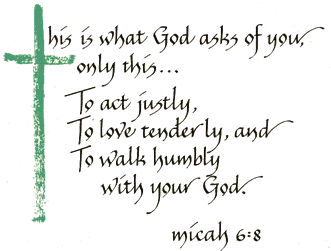catholicPittsburgh.org is the place for information, news, commentary, reflections and community building among the people of God who are renewing the Catholic Church in Western Pennsylvania.
More about us
Welcome ...
Partnering Groups
The following organizations are partners with catholicPittsburgh.org:
Articles
Did you know #9
by John Houk
Our new pope has begun to reach out with his first messages to Catholics and the world. Perhaps we can anticipate, from what we already know, what his first encyclical might say. You may have your own guess, but this is mine.
First he will acknowledge the state of the world with wars about race, class and money. Then deal with the prevalent lack of respect for authority. He will praise his predecessor and call for a renewed sense of the charity of Jesus Christ in the world. Then he will call for all Catholics to stop dissension and strife, of whatever character, among ourselves while calling for each Catholic to subject his opinion to the authority of his superior.
- By JohnHouk at Apr 21 2005 - 8:25pm
- Articles
- 2 comments
- Read more
Did You Know #8
By John Houk
At the present moment the death of Pope John Paul II has captured the attention of people like few other events ever have. He was a super-hero pope, with a charismatic personality that accomplished great things such as exercising global influence and courageous inter-religious dialogue. Yet this is also a time to push back from this outpouring of interest in the person of this pope and look at popes in general because we will soon have a new one.
Did You Know #7
By John Houk
Do Catholics have a duty to go to confession during the Easter Season? It seems common for Catholics to be told that they do. What does the Catechism of the Catholic Church say? But first a note about catechisms in general including the CCC.
Catechisms are like encyclopedias of what the Church teaches. They do not create new beliefs nor do they create new rules or disciplines. Catechisms gather information into one place for easy reference. A mature view of catechisms should include a respect for the author’s bias (what they choose to include or not to include and how they say it), and the intended audience.
25th Anniversary of Oscar Romero's Death
On 24 March 1980 Archbishop Oscar Romero, prophet of the church of El Salvador was celebrating Mass in the chapel of the Divine Providence Hospital. While lifting the gifts during the offertory a single shot pierced his heart. Another martyr joined the ranks of those who have spoken and then given their lives for the poor and powerless.
Below are quotes from this courageous preacher found in an article by Brian Pierce OP in the report by the Religious Task Force on Central America and Mexico.
What are we doing for people who need us the most?
By Patricia K. Thompson
I have watched the unfolding case of Terri Schiavo for months. This woman, in a persistent vegetative state for fifteen years after a collapse which left her brain without oxygen for several minutes, is at the center of a bitter dispute between her parents and her husband.
This morning’s paper stated that her parents have now petitioned that the husband divorce her, so that they may assume guardianship and keep the feeding tube in place which has kept her alive all these years. It is yet another episode in the string of rancorous exchanges between these two parties, and illustrates the necessity for a greater understanding of end-of-life care, and medical interventions in general.
Did You Know #6
by John Houk
”God is pure spirit in which there is no place for the difference between the sexes.” This could easily be one of our “who said this” pieces that we use to stimulate our readers. But since most of our readers are Catholics it would not be fair to infer that they may not know their Catechism. Yes, this statement is from paragraph 370 of the Catechism of the Catholic Church.
Did You Know #5
by John Houk
According to the norms of the Roman Catholic Church there is to be one crucifix in the front of the church during liturgy. The crucifix provides us with a visual reminder that Jesus was a victim of torture at the hands of the prevailing authorities. The crucifix can also remind us that torture exists in our world today, and that the governments of the world are primarily responsible for the torture that exist today just as they were in the time of Jesus.
War and Peace: The Dilemma of U.S. Foreign Policy
By Edward T. Brett, Ph.D.
Professor and Chair
Department of History
La Roche College.
Enough time has now passed for scholars to gain some perspective so they can begin the process of analyzing the terrible terrorist attack of September 11, 2001. Through the analytical process, historians, political scientists, sociologists, and others have a duty to try to uncover the underlying causes of this tragic event. Scholars must attempt to find out, for instance, why the 19 terrorists felt such hatred for the United States that they were willing to sacrifice their own lives in order to inflict harm on Americans. Scholars likewise need to ask if there is anything that the U.S. can now do to mitigate the possibility that a similar attack might take place in the future. Consequently, I will attempt in the following essay to present some of my thoughts on the September 11th tragedy from the perspective of a historian.
Micah 6:8

©1996 Cards by Anne
Used with permission